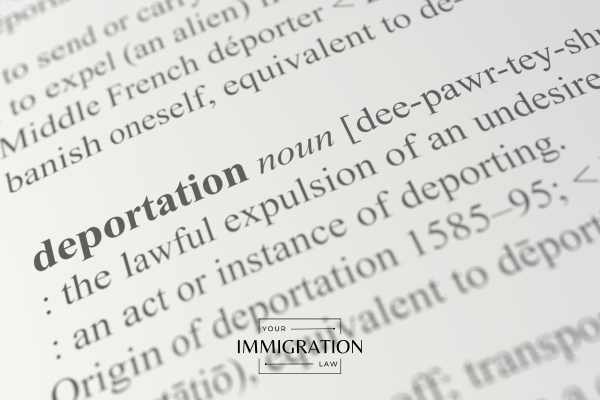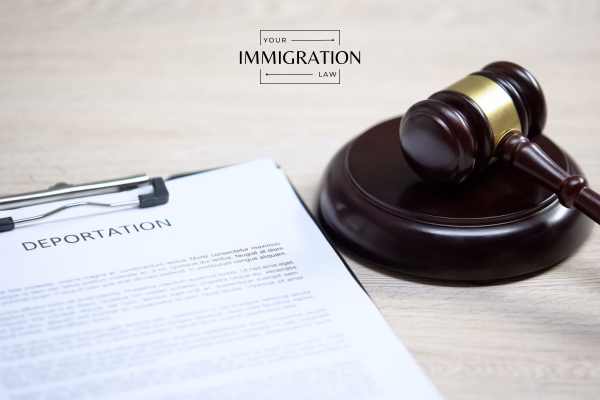Deportation can have a severe impact on individuals and families, disrupting lives and separating loved ones. A deportation defense attorney plays a crucial role in navigating the complex legal landscape to challenge deportation orders and explore options for relief. With their help, you can address legal issues effectively and work toward a favorable resolution.
If you’re facing the threat of removal proceedings, don’t wait to seek help. Contact Your Immigration Law today to discuss your case and develop a strong defense strategy. Take the first step towards protecting your right to stay in the United States and securing your future, call our law firm at 313-631-8080.
Detained vs. Non-Detained Deportation Cases
In immigration proceedings, deportation cases are categorized based on whether the individual is detained or not. Here’s a breakdown of the differences between detained and non-detained deportation cases:
Detained Deportation Cases
In a detained deportation case, the individual is held in custody by U.S. Immigration and Customs Enforcement (ICE) or another federal agency while their removal proceedings are ongoing. Key aspects of detained deportation cases include:
- Custody Status: The individual is physically detained, often in a detention facility or jail, during the proceedings. The detention may be due to various reasons, such as flight risk or concerns about public safety.
- Expedited Proceedings: Detained cases often proceed more quickly than non-detained cases because the individual is already in custody. This can lead to faster hearings and decisions.
- Legal Representation: Detained individuals may face challenges in accessing legal representation due to their incarceration. It is crucial to obtain an attorney who can visit them in detention and provide legal support.
- Bond Hearing: In some cases, the detained individual may be eligible for a bond hearing to request release from detention while their case is pending. The bond amount and eligibility are determined by an immigration judge.
- Impact on Legal Options: Being detained can limit an individual’s ability to prepare their case and gather evidence. It may also affect their ability to remain in contact with family and support networks.

Non-Detained Deportation Cases
In a non-detained deportation case, the individual is not held in custody and is allowed to remain in the community while their case is processed. Key aspects of non-detained deportation cases include:
- Custody Status: The individual is not physically detained and continues to live in their community. They are typically required to report regularly to ICE or attend scheduled court hearings.
- Standard Proceedings: Non-detained cases usually follow the standard procedural timeline for deportation proceedings. These cases might take longer to resolve compared to detained cases.
- Legal Representation: Individuals in non-detained cases generally have better access to legal representation and resources. They can work with their experienced immigration attorney more freely and have more time to prepare their case.
- Release Conditions: Since the individual is not detained, they do not need a bond hearing for release. However, they must comply with any conditions set by the court or ICE.
- Impact on Legal Options: Being non-detained provides more flexibility for preparing a defense and exploring legal options like asylum, cancellation of removal, or adjustment of status. The individual can maintain regular contact with their support network and attorney.
The primary difference between detained and non-detained deportation cases lies in the individual’s custody status during the proceedings. Detained cases involve incarceration, which can expedite the process but limit access to resources, while non-detained cases allow the individual to remain in the community, providing more time and flexibility to address their legal situation. Understanding these differences is crucial for navigating the deportation process and securing the appropriate legal support.
Common Reasons for Deportation
Deportation can stem from various factors, including legal violations, immigration status issues, or criminal convictions. Even if you have lawful permanent residency or a green card, you can still be deported under certain conditions.
Serious criminal convictions like domestic violence are a significant reason for deportation where you might not find relief from removal. This includes aggravated felonies such as murder or drug trafficking, as well as crimes involving moral turpitude like theft or immigration fraud. Some drug-related offenses can also result in potential deportation.
Immigration violations, such as obtaining your residency through fraud or abandoning your residency by spending long periods outside the U.S., can also put you at risk of removal. Additionally, activities related to national security, like engaging in terrorism or espionage, can result in removal.
Public health concerns, such as having a serious communicable disease, and misrepresentation, such as providing false information or using fraudulent documents, might also lead to deportation. Ignoring a deportation notice or re-entering the U.S. unlawfully after deportation can further complicate your situation. Unlawful employment, or working without proper authorization, is another potential basis for deportation.
How Long Do Deportation Proceedings Take?
The length of deportation proceedings can vary widely depending on several factors. Generally, the process can take from several months to a few years. Here are some key factors that influence the timeline:
- Case Complexity: The complexity of your case plays a significant role in how long the proceedings take. If your case involves complicated legal issues or requires extensive evidence, it may take longer to resolve.
- Court Backlog: The immigration court’s backlog can impact the timing of your case. High volumes of cases in immigration courts can lead to delays in scheduling hearings and issuing decisions.
- Type of Hearing: Master calendar hearings may be scheduled relatively quickly, often within a few months of the initiation of proceedings. Individual hearings, where the defense is presented, may be scheduled several months or even years after the master calendar hearings.
- Appeals and Motions: If you or the government files an appeal or motion, this can extend the duration of the proceedings. Appeals to the Board of Immigration Appeals (BIA) or motions to reopen or reconsider can add additional time to your case.
- Detained vs. Non-Detained Status: If you are detained, your case may proceed more quickly due to the expedited nature of detained cases. However, if you are not detained, the process might take longer as you are allowed to remain in the community while awaiting hearings.
- Legal Representation: The effectiveness and availability of legal representation can also affect the timeline. Having an experienced immigration lawyer can help ensure that your case progresses efficiently.
- Government Processing Times: The processing times of various government agencies involved in your case, such as U.S. Citizenship and Immigration Services (USCIS) or Immigration and Customs Enforcement (ICE), can influence the overall duration.
What Happens if I Lose My Deportation Case?
If you lose your deportation case, the immigration judge will issue a final order of removal at your immigration hearing. This order requires you to leave the U.S. within a specified time frame, which is typically 30 days but can vary. In some cases, you may be granted voluntary departure. This allows you to leave the U.S. on your own terms within a set period of time, often 60 to 120 days. This option helps avoid a formal deportation record, which can be beneficial for future immigration matters.
If you are not granted voluntary departure, you may be detained by ICE until your removal from the U.S. This could mean being held in an immigration detention facility or jail.

You have the right to appeal immigration decisions. It is a good idea to hire an experienced deportation defense attorney to help you with this appeal. An appeal must be filed with the Board of Immigration Appeals (BIA) within 30 days of the judge’s decision. The appeal allows you to challenge the removal order and present new evidence or legal arguments. If the BIA denies your appeal, you may have further options, including seeking judicial review in federal court.
A final order of removal can affect your ability to return to the U.S. in the future. A deportation can result in a bar on reentry, which may last several years or even permanently, depending on the grounds for deportation.
Defend Against Deportation: Legal Support for Your Case
Deportation proceedings can be overwhelming, but you don’t have to face them alone. A skilled deportation lawyer can guide you through the legal process and help you build a strong defense against the threat of deportation.
Take control of your defense against deportation today. Contact a deportation attorney at Your Immigration Law to discuss your case and find out how you can protect your right to remain in the U.S. Your future is worth fighting for—get the legal help you need now.